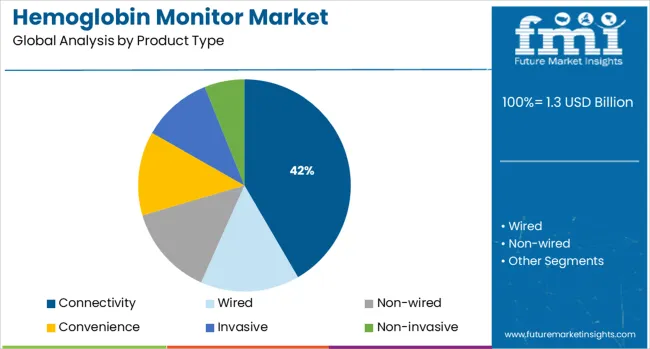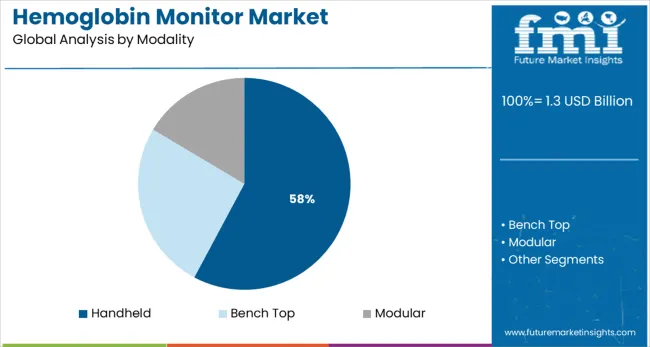The hemoglobin monitor market is valued at USD 1.3 billion in 2025 and is expected to reach USD 2.7 billion by 2035 at a CAGR of 7.8%. Market expansion over the next decade is shaped by rising adoption of point-of-care diagnostics, increasing prevalence of chronic diseases, and the shift toward portable monitoring devices used across hospitals, emergency care, and home-care environments. Connectivity-enabled hemoglobin monitors account for 41.6% share in 2025, supported by growing demand for wireless, data-integrated diagnostic tools that improve clinical decision-making and remote-monitoring efficiency. The handheld modality leads with 57.8% share, driven by its compact design, faster testing turnaround, and suitability for bedside care, community screening, and field diagnostics.
Widespread adoption in blood donation centers, rising emphasis on rapid anemia screening, and strong procurement activity across North America, Asia-Pacific, and Europe reinforce market progress. Healthcare systems continue to prioritize compact, connected diagnostic equipment that reduces testing delays and enhances operational convenience. While regulatory pricing pressure and high device installation costs create constraints, continuous upgrades from industry leaders including Masimo, Siemens Healthineers, Philips, Nihon Kohden, and GE Healthcare strengthen performance reliability and user comfort. As disease burden rises and preventive diagnostics gain prominence, hemoglobin monitoring devices maintain their strategic relevance across clinical and non-clinical healthcare settings.

| Metric | Value |
|---|---|
| Hemoglobin Monitor Market Estimated Value in (2025 E) | USD 1.3 billion |
| Hemoglobin Monitor Market Forecast Value in (2035 F) | USD 2.7 billion |
| Forecast CAGR (2025 to 2035) | 7.8% |

The connectivity segment, holding 41.6% share in 2025, leads owing to the increasing preference for wireless-enabled diagnostic devices that streamline data transfer between monitors, electronic medical records, and clinician dashboards. Connectivity improves workflow efficiency by eliminating manual data entry errors and enabling real-time patient tracking, particularly in emergency settings and chronic-care management programs. Hospitals and private healthcare facilities are rapidly transitioning to digital diagnostic ecosystems, which elevates demand for connected hemoglobin monitors capable of Bluetooth, Wi-Fi, or cloud-based integration. As remote monitoring and telehealth platforms continue to scale, the connectivity segment gains prominence as the most advanced and clinically efficient solution.

The handheld modality, accounting for 57.8% share in 2025, dominates due to its portability, rapid diagnostic capabilities, and strong suitability for point-of-care applications. Handheld devices are widely used in community health programs, blood donation camps, emergency medical services, and home-care environments where immediate hemoglobin assessment is critical. Their compact size reduces manufacturing cost and increases affordability, expanding accessibility across both developed and emerging healthcare markets. Increasing adoption in long-term care facilities, along with higher usage among diabetic and anemic patient groups requiring continuous monitoring, ensures sustained leadership of the handheld segment. As the demand for quick, user-friendly diagnostic tools rises, handheld hemoglobin monitors remain the preferred choice across diverse clinical settings.
The cost associated with manufacturing a hemoglobin monitor is determined by its size, purpose, and features. Having recently been approved by the USA FDA, hemoglobin monitors of compact size will likely drive sales of the hemoglobin monitor market.
With the availability of small hemoglobin monitors, the cost will be reduced, and subsequently, the demand for hemoglobin monitors will increase. It is anticipated that the change in the nature of the product, namely the point-of-care version, will increase the demand for hemoglobin monitors in long-term care.
Technological advancements such as wireless connectivity are anticipated to increase the demand and acceptability of hemoglobin monitors as well as increase the up-gradation of hemoglobin monitors. Patients suffering chronically from diabetes are expected to raise the requirement for these devices.
The limitations to the growth of the hemoglobin monitor market can be downward pricing pressure from respective regulatory bodies to expand the reach of hemoglobin monitors at affordable prices.

Geographically, the hemoglobin monitor market is segmented into seven regions, viz. South Asia, East Asia, Europe, Latin America, North America, Oceania, and the Middle East and Africa.
Blood donation is an important part of the hemoglobin monitoring market. By donating more blood units, more such products could be manufactured, thereby propelling hemoglobin monitor market opportunities. While developed economies will continue to play an important role in the hemoglobin monitor market, emerging economies are also taking the market by storm.
In the hemoglobin monitor market, North America is expected to have a significant share, in part because of its quality infrastructure and installed base, which supports the demand for hemoglobin monitors. It is followed by Europe, East Asia, and Oceania.
Given the current change in adoption and growth in the general pharmaceutical market, the South Asia hemoglobin monitor market could prove lucrative for manufacturers and industry professionals. Other reasons for the lucrative market growth for hemoglobin monitors in South Asia are its large population and its disease burden.

The present market structure of the hemoglobin monitor market is expected to change with efforts and research present in the clinical phase.
The involved in the market of hemoglobin monitor market include Masimo Corporation, Bayer AG, Siemens Healthineers, Welch Allyn, Inc., Koninklijke Philips N.V, Medtronic plc, Nihon Kohden Corporation, GE Healthcare, Smiths Group, and Omron Healthcare.
| Report Attribute | Details |
|---|---|
| Growth rate | CAGR of 7.8% from 2025 to 2035 |
| Base year for estimation | 2024 |
| Historical data | 2020 to 2024 |
| Forecast period | 2025 to 2035 |
| Quantitative units | Revenue in USD Billion, and CAGR from 2025 to 2035. |
| Report coverage | Revenue forecast, volume forecast, company ranking, competitive landscape, growth factors, and trends, Pricing Analysis |
| Segments covered | Product type, modality, end-user, and geography |
| Regional scope | North America; Latin America; Europe; South Asia; East Asia; Oceania; Middle East and Africa |
| Country scope | USA, North America, Canada, Europe, Germany, UK, France, Italy, Spain, Asia Pacific, Japan, China, India, Latin America, Mexico, Brazil, Middle-East and Africa, South Africa, Saudi Arabia |
| Key companies profiled | Masimo Corporation; Bayer AG; Siemens Healthineers; Welch Allyn, Inc.; Koninklijke Philips N.V; Medtronic plc; Nihon Kohden Corporation; GE Healthcare; Smith’s Group and Omron Healthcare. |
| Customization scope | Free report customization (equivalent to up to 8 analysts working days) with purchase. Addition or alteration to country, regional & segment scope. |
| Pricing and purchase options | Avail customized purchase options to meet your exact research needs. |
The global hemoglobin monitor market is estimated to be valued at USD 1.3 billion in 2025.
The market size for the hemoglobin monitor market is projected to reach USD 2.7 billion by 2035.
The hemoglobin monitor market is expected to grow at a 7.8% CAGR between 2025 and 2035.
The key product types in hemoglobin monitor market are connectivity, wired, non-wired, convenience, invasive and non-invasive.
In terms of modality, handheld segment to command 57.8% share in the hemoglobin monitor market in 2025.






Our Research Products

The "Full Research Suite" delivers actionable market intel, deep dives on markets or technologies, so clients act faster, cut risk, and unlock growth.

The Leaderboard benchmarks and ranks top vendors, classifying them as Established Leaders, Leading Challengers, or Disruptors & Challengers.

Locates where complements amplify value and substitutes erode it, forecasting net impact by horizon

We deliver granular, decision-grade intel: market sizing, 5-year forecasts, pricing, adoption, usage, revenue, and operational KPIs—plus competitor tracking, regulation, and value chains—across 60 countries broadly.

Spot the shifts before they hit your P&L. We track inflection points, adoption curves, pricing moves, and ecosystem plays to show where demand is heading, why it is changing, and what to do next across high-growth markets and disruptive tech

Real-time reads of user behavior. We track shifting priorities, perceptions of today’s and next-gen services, and provider experience, then pace how fast tech moves from trial to adoption, blending buyer, consumer, and channel inputs with social signals (#WhySwitch, #UX).

Partner with our analyst team to build a custom report designed around your business priorities. From analysing market trends to assessing competitors or crafting bespoke datasets, we tailor insights to your needs.
Supplier Intelligence
Discovery & Profiling
Capacity & Footprint
Performance & Risk
Compliance & Governance
Commercial Readiness
Who Supplies Whom
Scorecards & Shortlists
Playbooks & Docs
Category Intelligence
Definition & Scope
Demand & Use Cases
Cost Drivers
Market Structure
Supply Chain Map
Trade & Policy
Operating Norms
Deliverables
Buyer Intelligence
Account Basics
Spend & Scope
Procurement Model
Vendor Requirements
Terms & Policies
Entry Strategy
Pain Points & Triggers
Outputs
Pricing Analysis
Benchmarks
Trends
Should-Cost
Indexation
Landed Cost
Commercial Terms
Deliverables
Brand Analysis
Positioning & Value Prop
Share & Presence
Customer Evidence
Go-to-Market
Digital & Reputation
Compliance & Trust
KPIs & Gaps
Outputs
Full Research Suite comprises of:
Market outlook & trends analysis
Interviews & case studies
Strategic recommendations
Vendor profiles & capabilities analysis
5-year forecasts
8 regions and 60+ country-level data splits
Market segment data splits
12 months of continuous data updates
DELIVERED AS:
PDF EXCEL ONLINE
Monitoring Tool Market Size and Share Forecast Outlook 2025 to 2035
Hemoglobin Analyzer Market Size and Share Forecast Outlook 2025 to 2035
Pet Monitoring Camera Market Size and Share Forecast Outlook 2025 to 2035
Brix Monitor Market Size and Share Forecast Outlook 2025 to 2035
Pain Monitoring Devices Market Size and Share Forecast Outlook 2025 to 2035
Glycohemoglobin Analyzers Market Size and Share Forecast Outlook 2025 to 2035
Dose Monitoring Devices Market - Growth & Demand 2025 to 2035
Brain Monitoring Market Size and Share Forecast Outlook 2025 to 2035
Motor Monitoring Market Size and Share Forecast Outlook 2025 to 2035
Neuro-monitoring System Market Size and Share Forecast Outlook 2025 to 2035
Media Monitoring Tools Market Size and Share Forecast Outlook 2025 to 2035
Noise Monitoring Devices Market Size and Share Forecast Outlook 2025 to 2035
Nerve Monitoring Devices Market Insights - Growth & Forecast 2025 to 2035
Yield Monitor Market Growth – Trends & Forecast 2025 to 2035
Power Monitoring Market Report - Growth, Demand & Forecast 2025 to 2035
Urine Monitoring Systems Market Analysis - Size, Trends & Forecast 2025 to 2035
Brain Monitoring Systems Market is segmented by Lateral Flow Readers and Kits and Reagents from 2025 to 2035
Flare Monitoring Market
Yield Monitoring Systems Market
In-Ear Monitors (IEMs) Market Analysis - Size, Share, and Forecast 2025 to 2035

Thank you!
You will receive an email from our Business Development Manager. Please be sure to check your SPAM/JUNK folder too.
Chat With
MaRIA